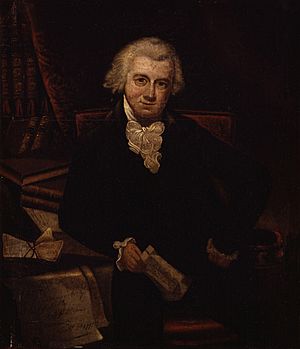John Reeves (activist) facts for kids

John Reeves (born November 20, 1752 – died August 7, 1829) was an important figure in British history. He was a legal expert, a government worker, and a judge. He also worked to support conservative ideas. He became the first Chief Justice of Newfoundland.
In 1792, he started a group called the Association for Preserving Liberty and Property against Republicans and Levellers. This group aimed to stop the spread of ideas that supported the French Revolution. These ideas were often found in books like Rights of Man by Thomas Paine. Many people at the time saw Reeves as a "saviour" of Britain because of his actions against these revolutionary ideas.
Contents
John Reeves' Life and Work
John Reeves went to Eton College and Merton College, Oxford for his education. Later, he became a Fellow at The Queen's College, Oxford. In 1779, he became a lawyer. He held several important government jobs, including working for the Royal Mint and the Board of Trade.
After the Gordon Riots in 1780, he helped create a new police plan for London. This plan was not approved in Britain because it seemed too strict. However, a similar plan was passed in Ireland as the Dublin Police Act 1786. This law created the first modern police force in the British Isles. It later inspired Robert Peel when he set up police forces in the UK.
Reeves also served as the Chief Justice of Newfoundland and Labrador for two summers (1791 and 1792). He then returned to England to become the paymaster for judges. He was also chosen as a member of the Society of Antiquaries and the Royal Society. In 1800, he became the King's Printer, which meant he was in charge of printing official government documents.
The Association for Britain
John Reeves strongly opposed ideas that came from the French Revolution, sometimes called "Jacobinism." These ideas often called for big changes to government and society. To fight these ideas, he started the Association for Preserving Liberty and Property against Republicans and Levellers in 1792.
This group was very successful. It quickly grew to have over 2,000 local branches across Britain. Members of the Association worked to stop meetings of people who supported revolutionary ideas. They also went after printers who published works by people like Thomas Paine. The Association also started legal cases against those spreading "sedition," which meant ideas that encouraged rebellion against the government. They also printed many pamphlets that supported the King and the British government.
Most of these loyalist groups stopped meeting within a year. They had successfully stopped the groups they opposed. Some people, like the politician Charles James Fox, criticized the Association. Fox said that some of their writings were too extreme.
His Book: Thoughts on the English Government
In 1795, Reeves published a book called Thoughts on the English Government. He wrote it anonymously at first. In this book, he shared his ideas about how the British government worked. He wanted to explain his views to the "quiet good sense of the People of England." He wrote that he was an Englishman and not a "Citizen of the World," meaning he was loyal to his own country.
In his book, Reeves used a metaphor to describe the British government. He said the monarchy (the King or Queen) was like the trunk of a tree. The Parliament and courts were like the branches. Some people, including a group of Whig politicians, thought this idea was wrong. They believed it insulted the British Constitution.
A special committee in Parliament was set up to find out who wrote the book. Reeves was put on trial for "libel on the British Constitution." This meant he was accused of writing something that unfairly criticized the government. However, he was found not guilty. The jury did say that his book was a "very improper publication." Reeves later published more parts of his Thoughts in 1799 and 1800.
In 1801, Reeves wrote another book about the King's coronation oath. He supported the King's view that this oath prevented Roman Catholics from being in Parliament. He also believed that Presbyterianism, another Protestant religion, was a bigger threat to the Church and state than Catholicism.
John Reeves' Publications
- An Enquiry into the Nature of Property and Estates as defined by the Laws of England (1779)
- History of English Law (five volumes, 1783 to 1829)
- A Chart of Penal Laws, exhibiting by lines and colours an historical view of crimes and punishments, according to the law of England (1779)
- Legal Considerations on the Regency, as far as it regards Ireland (1789)
- A History of the Law of Shipping and Navigation (1792) - A guide for the Board of Trade
- History of the Government of the Island of Newfoundland (1793)
- The Malecontent: A Letter from an Associator to Francis Plowden, Esq. (1794)
- Thoughts on the English Government (four letters, 1795 to 1800)
- A Collation of the Hebrew and Greek Texts of the Psalms (1800)
- Considerations on the Coronation Oath to maintain the Protestant Reformed Religion, and the Settlement of the Church of England (1801)
- Discussions on the question of whether inhabitants of the United States, born there before the Independence, are, on coming to this Kingdom, to be considered as natural born [British] subjects (written 1809-1810, published later)
 | Precious Adams |
 | Lauren Anderson |
 | Janet Collins |

